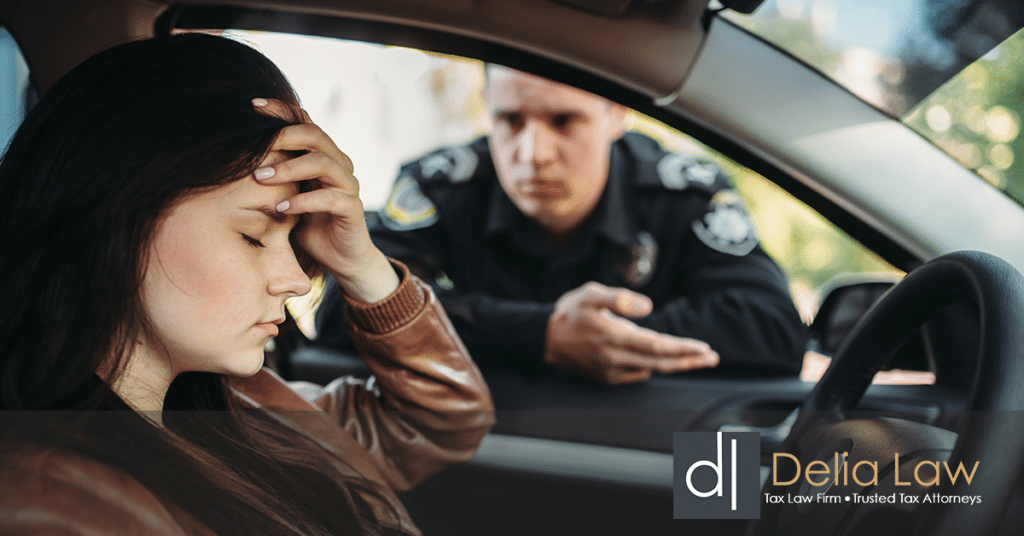Losing your driver’s license over unpaid taxes might sound extreme, but in New York State, it’s not just a threat — it’s a legal enforcement tool used by the New York State Department of Taxation and Finance (NYS DTF). If you owe $10,000 or more in back taxes, your driver’s license can be suspended until the tax debt is resolved. For many taxpayers, this kind of license suspension feels sudden and overwhelming — especially when it puts jobs, family obligations, or day-to-day life at risk.
If this has happened to you, or if you’ve received a 60-day warning letter from the state, here’s what you need to know about how the process works, what your legal options are, and how a New York tax attorney can help you respond effectively and protect your ability to drive.
Table of Contents
- Why Did NY Suspend My Driver’s License for Tax Debt?
- Who Is at Risk?
- What Is the DTF-5303 Letter?
- What Is the Process Before Suspension?
- What Are My Options to Avoid or Lift a Suspension?
- Steps to Reinstate Your License After Suspension
- Can I Challenge the Suspension?
- What Happens If I Drive With a Suspended License?
- Why This Program Exists
- Why Hire a New York Tax Attorney?
- How Delia Law Can Help
- Frequently Asked Questions (FAQs)
- Don’t Wait Until It’s Too Late
Why Did NY Suspend My Driver’s License for Tax Debt?
Under New York Tax Law Section 171-v, the Department of Taxation and Finance (DTF) can instruct the Department of Motor Vehicles (DMV) to suspend your license if you owe $10,000 or more in personal income tax debt. This includes not only unpaid taxes but also accumulated interest and penalties.
This law is not about punishing tax evasion per se—it’s about compelling payment. If you’ve already exhausted appeals and your debt is considered “fixed and final,” the state can and will use license suspension as a collection tactic.
Commercial driver’s licenses are exempt, but nearly all personal licenses are subject to this rule.
Why This Program Exists
This license suspension initiative was introduced in 2013 as part of a broader enforcement campaign to increase tax compliance. It was projected to generate $26 million in its first year and continues to be a significant source of revenue for the state.
For the state, suspending licenses is an effective way to grab attention and push taxpayers to act. For individuals, however, it can feel like a punishment that escalates quickly.
Who Is at Risk?
If you meet any of the following conditions, you may be at risk for a driver’s license suspension:
- You owe $10,000 or more in back taxes to New York State.
- You have ignored multiple notices from the DTF.
- You haven’t entered into a valid payment arrangement.
- You failed to dispute or appeal the tax debt.
- You are personally liable for business tax debt, such as sales or payroll tax, even if the liability originated from your business.
This law applies to individuals, not entities—but if you have personal responsibility for tax debt, you’re still at risk of suspension.
What Is the DTF-5303 Letter?
Before suspension occurs, you will receive a Notice of Proposed Driver License Suspension, officially called Form DTF-5303. This is your formal 60-day warning.
The letter will outline:
- The total amount of tax owed
- The periods involved
- The deadline to respond
- Instructions for resolving the issue
Failing to act on this notice allows the DMV to proceed with suspension after the deadline.
What Is the Process Before Suspension?
The state doesn’t suspend your license without warning. Here’s how the process typically unfolds:
- 60-Day Notice of Proposed Driver License Suspension (Form DTF-5303): This notice from DTF is your first official warning. It lists the amount owed and gives you 60 days to pay, set up a payment plan, or challenge the claim.
- 15-Day DMV Suspension Notice: If you don’t act within the initial 60 days, the DMV sends a final notice. At this point, you have 15 days before your license is suspended.
If you fail to take action within either window, the DMV will proceed with suspension. Driving after that point is considered a criminal offense.
What Are My Options to Avoid or Lift a Suspension?
If you’ve received a 5303 notice or believe you’re at risk of a driver’s license suspension, now is the time to act. Depending on where you are in the process, you may still be able to stop the suspension before it happens—or, if your license has already been suspended, take steps to get it reinstated. The right option depends on your situation and how far the state has gone with enforcement.
- Pay the Full Amount Owed
The most straightforward option is to pay the full balance. Once you do, the DTF will notify the DMV to lift the suspension. Payment can be made online or through other approved channels. - Set Up a Payment Plan (IPA)
If you can’t afford to pay in full, setting up an Installment Payment Agreement (IPA) with the DTF can prevent or reverse the suspension. Just be careful: if you miss more than one payment within a 12-month period, the state can suspend your license immediately without another 60-day notice. - Apply for an Offer in Compromise (Request a Settlement)
If paying the full amount is truly out of reach, you may qualify for a New York Offer in Compromise, which allows you to settle your debt for less. This option is typically reserved for those who can demonstrate financial hardship. - Dispute the Tax Debt
If you believe the tax amount is incorrect, you can file an appeal or request a hearing within the 60-day window. Evidence or documentation will be required, and legal representation is recommended. - Claim Innocent Spouse Relief
If the tax debt originated with your spouse or ex-spouse, and you believe you should not be held responsible, Innocent Spouse Relief may apply. This is especially important if the debt was accrued without your knowledge or participation. - Prove Economic Hardship
Though rare, it’s possible to request consideration for financial hardship. You’ll need to provide substantial documentation showing that license suspension would severely impact your ability to support yourself or your dependents. - Request a Restricted License
If your license is already suspended, you may be able to apply for a restricted license. This type of license limits your driving to essential needs like commuting to work or caring for dependents.
Steps to Reinstate Your License After Suspension
If your license has already been suspended, here are the general steps to get it reinstated:
- Resolve the Tax Debt – Pay in full, settle, or enter into a payment plan.
- Obtain Clearance from NYS DTF – Once your tax issue is resolved, the DTF will notify the DMV.
- Pay Reinstatement Fees to DMV – Fees may vary depending on your situation.
- Verify Reinstatement – Confirm with the DMV that your driving privileges have been restored.
Can I Challenge the Suspension?
In some cases, yes—but the window is narrow and the grounds for appeal are limited. You generally can only challenge the suspension if:
- You are not the correct person liable for the debt.
- You already paid the debt in full.
- Your wages are currently being garnished for the same liability.
- You are paying court-ordered child or spousal support.
- You hold a commercial driver’s license.
- You’ve filed for bankruptcy and the case is ongoing.
- You never received prior notice from DTF.
The appeal must be submitted promptly, often within the initial 60-day period after receiving the 5303 letter. It is strongly recommended to work with a qualified New York tax attorney for this. Once the DMV acts, reversing the suspension becomes more difficult.
What Happens If I Drive With a Suspended License?
If you continue driving after your license is suspended, you’re risking far more than fines. In New York, this is considered a criminal misdemeanor under VTL §511.
Penalties can include:
- Criminal charges
- Hefty fines
- Additional license penalties or revocations
- Jail time (especially for repeat offenses)
If your license is suspended, do not drive. Focus instead on resolving the underlying tax issue and restoring your license legally. This is the point where having an experienced New York tax attorney can make all the difference. Delia Law can help you take immediate action to address the suspension, negotiate with the NYS DTF, and begin the process of getting your license reinstated.
Why Hire a New York Tax Attorney?
While CPAs and tax preparers are helpful when it comes to filing returns, only a licensed tax attorney can represent you in legal matters involving the New York State Department of Taxation and Finance (DTF) and the Department of Motor Vehicles (DMV). Tax attorneys offer:
- Legal representation at hearings or in court
- Negotiation of settlements, payment plans, and Offers in Compromise
- Protection of your rights under state and federal tax law
- Full confidentiality through attorney-client privilege
An experienced tax attorney will assess your full situation and pursue the best course of action to avoid or reverse license suspension.
How Delia Law Can Help
At Delia Law, we help New York residents navigate serious tax matters that can impact their ability to live and work freely—including driver’s license suspensions tied to back taxes. Our team of New York tax attorneys has successfully:
- Prevented license suspensions through fast, proactive intervention
- Negotiated payment plans and settlements that satisfied DTF requirements
- Challenged inaccurate tax assessments that led to enforcement actions
- Represented clients during DTF and DMV proceedings when timing was critical
We know how disruptive a suspended license can be. That’s why we work quickly and strategically to protect your rights and resolve the underlying tax issue as efficiently as possible.
Our services include:
- Tax debt negotiation
- Offers in Compromise
- Installment Agreements
- Representation before the NYS DTF and DMV
- Audit defense
- Emergency license reinstatement assistance
Frequently Asked Questions (FAQs)
Can my license be suspended without warning?
No. You must first receive a 5303 letter, giving you 60 days to resolve the debt or respond. Suspension without that notice would be a procedural error.
What if I can’t afford to pay the full tax debt?
You may qualify for a payment plan or Offer in Compromise based on your financial situation. These programs are designed to help taxpayers resolve their obligations in a manageable way.
Will my suspension show up on my driving record?
Yes. The suspension may appear on your record and could be listed as related to “non-payment of taxes.”
Can I drive to work with a suspended license?
No. Driving with a suspended license is a criminal offense in New York. Even if you’re only driving to work, you could face arrest, fines, or jail time. You must resolve the suspension or apply for a restricted license.
Don’t Wait Until It’s Too Late
Time is not on your side once you receive a 5303 letter. The longer you wait, the more limited your options become, and the harder it is to regain control. Whether you’re dealing with an impending suspension or already had your license taken, the right legal guidance can help you resolve the issue faster and with less stress.
Delia Law helps taxpayers in New York and across the country navigate complex IRS and state tax issues—including driver’s license suspensions related to back taxes. If you’re unsure what to do next, start by reaching out. We’ll help you evaluate your situation and develop a clear action plan.














